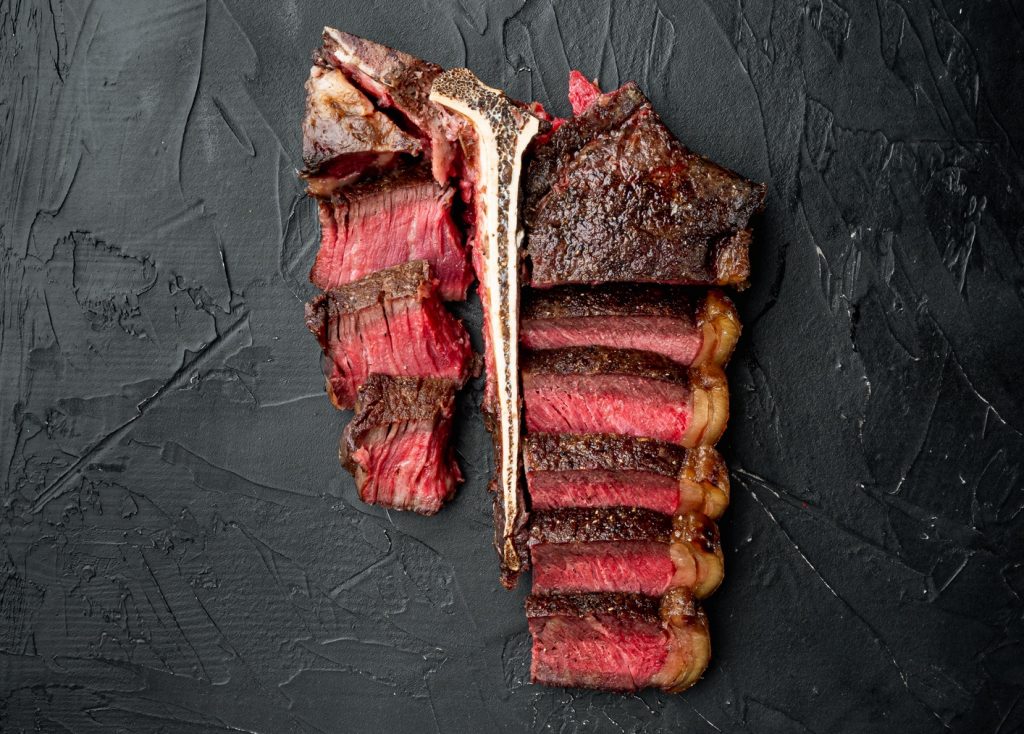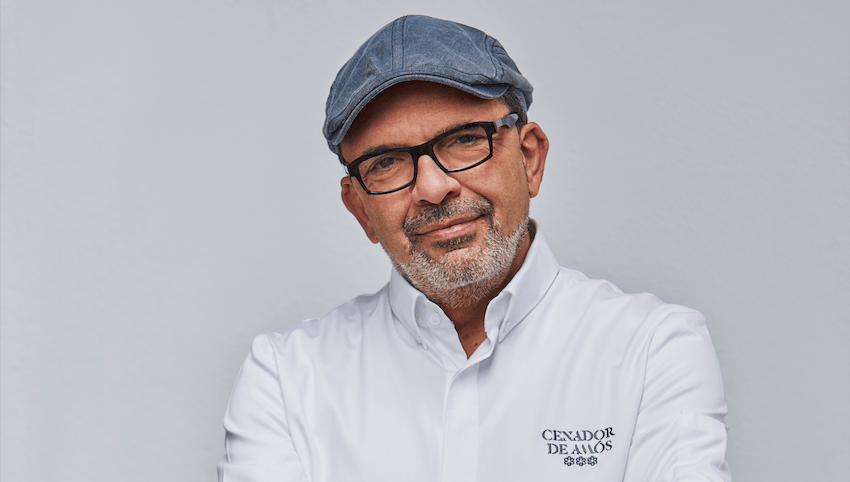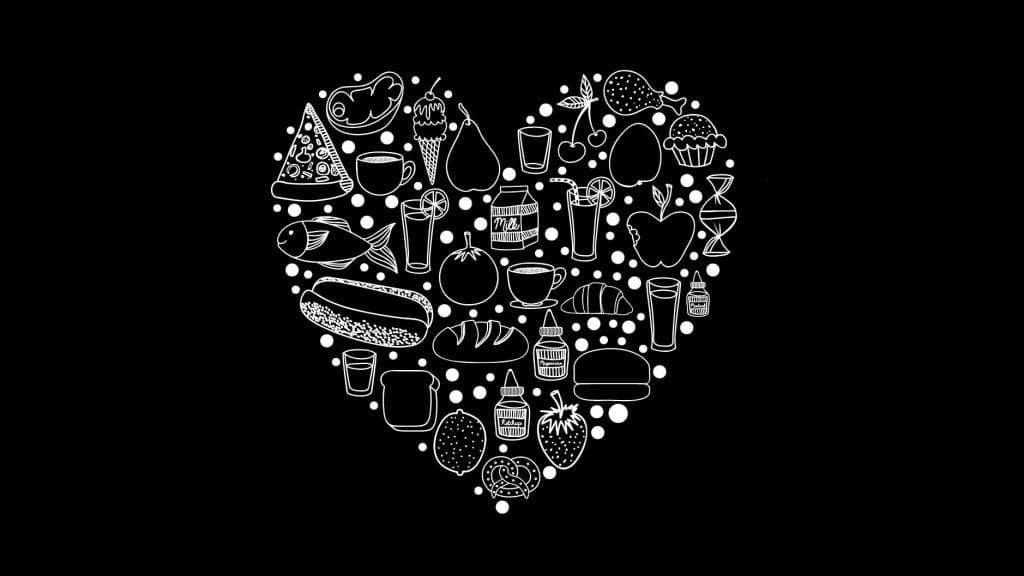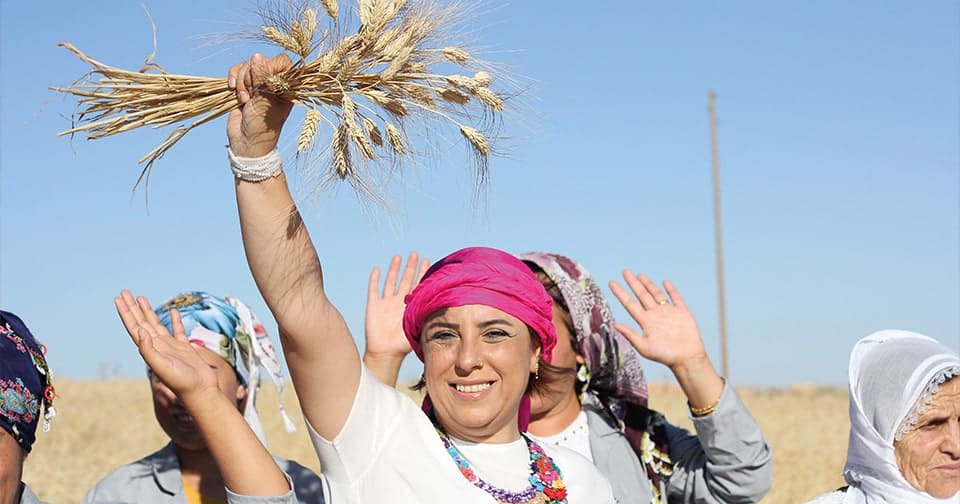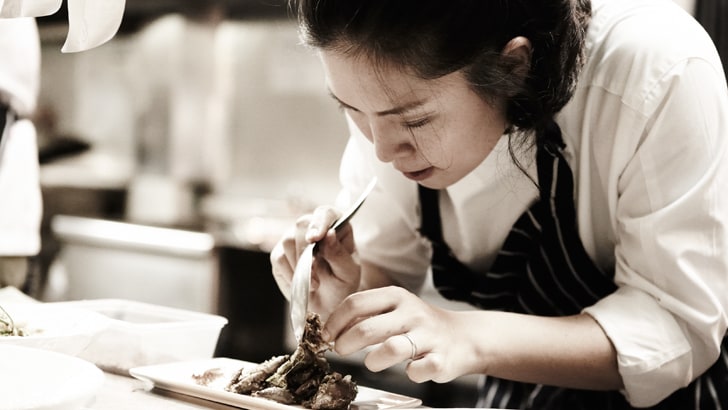
The Thai chef is behind Bo.lan, one of the five restaurants in Thailand to make it to the prestigious 50 Best list.
Away from the busy traffic of Bangkok, Bo.lan is tucked away in a soi (side street) off Sukhumvit 26 – it’s a location discerning diners are keen to seek out for an authentic, gorgeous Thai meal. The afternoon I arrive, waitresses are preparing for dinner service while a 15-month old toddler, named Keith, runs around the garden, giggling in excitement. From the kitchen, chef Dylan Jones emerges, introducing himself. He is the other half of the Bo.lan tandem, chef Bo’s husband, and father to Keith. “Bo will soon be here,” he informs me. It is hard to imagine this Australian chef has only been in Thailand for five years, for he speaks, writes and reads Thai fluently.
As I admire the restaurant, set in an old bungalow home, Bo arrives clad in khaki trousers, a dark blue T-shirt, her hair tied up in a ponytail, and her face without a trace of make-up. She is no diva, simply a no-nonsense, down-to-earth 33-year-old woman. She sips a latte while recounting her food journey.
Artistic difference
Chef Bo grew up helping her parents cook Thai-Chinese food at home; mostly braised dishes, a lot of soups, and deep-fried food. Her father is Taiwanese, but moved to Thailand 40 years ago. Bo didn’t take a direct path to her career. Her parents insisted on her getting a university degree, so she enrolled at the Faculty of Arts studying English and French. Incredibly bored after two years, Bo told her mother that she could no longer bear it. “I really wanted to go to cooking school, but at that time there was no culinary degree in Thailand,” she explains. She explored Australian institutions, choosing a business degree in restaurant and catering management from Griffith University’s Hotel Management School. Negotiating with her parents, she pointed out studying for a Bachelor of Arts was a waste of time, money and effort for something she did not like. They eventually conceded, and sent her to study on Australia’s Gold Coast.
Three years later, Bo returned to Bangkok, hoping to land a hotel job. After applying to 40 hotels, no one hired her. They claimed she was either overqualified or did not have any experience. “I didn’t have any experience because no one wanted to employ me,” she says. With her brother and sister both having masters degrees, her mother suggested Bo return to Australia to secure an MA in Gastronomy at the University of Adelaide & Le Cordon Bleu. Bo replied: “If you want me to get a masters, I will get one. But after that, can I do what I want?” Finding Adelaide a bit too quiet for her liking, Bo returned to Bangkok after six months to complete her degree online. Once more, she tried to apply for a job in the hotels in Bangkok. Thanks to a walk-in interview, she secured a job as a waitress at the Marriott. But preferring a kitchen job to a front of house job, she went to the Metropolitan Hotel Bangkok for another walk-in interview one week later. She recalls: “Luckily for me, the executive chef was Amanda Gale. So we spoke the same language.” This Australian chef, who trained under Neil Perry for years, told her upfront: “I don’t have the time to teach you anything, but if you like you can join my team.”
Bo knew she was hired because she spoke English. They had not seen her cook, nor did she have any professional experience of cooking beyond her training. She joined the team at Cy’an as a commis 3, assigned to pick herbs and peel vegetables. “But because it’s an Aussie kitchen they let you do everything from start to finish, like the British kitchen. It’s not like an American kitchen, where there’s a prep cook or a line cook.” Bo learned how to make an entire dish, not just chopping ingredients. “Chef Amanda rotated the staff quite often, so you didn’t get stuck in one station forever, which was good for me. But I think my primary responsibility was to translate for her and the sous chef.” She explains: “There were a couple of people who could speak English in the kitchen, but a lot of them couldn’t. However, they had the skills to do the job and I didn’t. So I was asked to explain this and that.”
Thanks to her language skills, Bo became an indispensible asset in the hotel kitchen, linking the foreign chefs with the Thai chefs. After close to two years, the voracious learner approached her mentor, saying: “I’m getting sick of Bangkok. I’ve learned all the sections already.” Knowing that most of Gale’s inspiration came from European chefs and restaurants, Bo asked: “Do you think I can go to Europe and do something there?” Her mentor bluntly told her she would not survive in a French, Italian or Spanish kitchen. She had neither the language skills, nor the culinary techniques. But Gale had a friend in London doing Thai food, so she asked if Bo would like to go there instead. Her boss told her: “London is a place where you speak the language, and you can work with a cuisine you are familiar with. You know the flavours and ingredients.” With Gale’s recommendation, Bo moved to London to work at David Thompson’s restaurant, Nahm. It was not an easy transition. In Bangkok, proteins such as prawns were ready-peeled for the cooks, and the meat was pre-portioned. In London, she had to do everything from scratch.
“When three cases of squid came in, you had to clean it, julienne everything, and prepare the dressings to be ready for the salad station.” The pace was much faster in London, she remembers. “I didn’t walk, I ran in the kitchen because I couldn’t do things as fast as the men.” She worked 18-hour days on three days, and 12 to 13 hours the rest of the week. The pay and workload did not add up in a city with such a high cost of living. But one thing Bo did find in London was love. Her relationship with Nahm’s Australian chef Dylan Jones blossomed away from the kitchen. After close to two years at Nahm, Bo and Dylan returned to Bangkok to open their own restaurant.
Bo recalls: “When we arrived, there were two types of restaurant: one was set really beautifully, with good ambiance and excellent service. But the food was stereotypically Thai: Tom Yum, Phad Thai, and Som Tam. They think foreigners cannot take spices or shrimp paste. They dumb down the flavours so foreigners can eat it. The other type was the yummy food in the street eaten with plastic cutlery. I wanted to merge the two together: delicious Thai food in a nice setting with good service.”
Despite their clear vision for Bo.lan, getting investors onboard was not easy. “Because we had not opened a restaurant before, no one knew what we were capable of doing,” Bo explains. “They did not want to put too much investment in, so we needed a lot of people to pitch in to make it happen.” The restaurant now has local and international acclaim. It is one of only five restaurants to make it to the 50 Best Restaurants in Asia, and is proud to be the only Thai restaurant run by a Thai chef to make it to the list.
The bigger picture
Beyond the restaurant, Bo is a committed educator. Prior to the birth of her son, she taught F&B management and Thai cuisine at two Thai universities. She also hosts a TV show called, Eat Am Are, on the Thai PBS channel. The weekly show discusses important issues around Thai food and food security. “I talk about where the produce comes from, and where it is going. I’m very strict about the ingredients I use in the show. I don’t use frozen prawns. It has to be ocean fish, freerange chickens, organic eggs and things like that. We tie in sustainable, eco-friendly cooking.” When she returned from London, she brought home the Slow Food Movement, starting the chapter in Bangkok.
Her goal is for Bo.lan to be a zero-carbon restaurant by 2018. She already works closely with local farmers, advocating bio-diversified produce as reflected in her ever-changing menu. She points out: “We already source everything locally and use organic produce.” But there are other things they still wish to change. Kitchen waste is turned into fertiliser, but they would like to convert it to methane gas so they can be less dependent on gas companies. They used organic cotton from Chiang Mai for the waiting staff’s uniforms, and will soon shift to using organic cotton napkins, too. They now filter and bottle their own water. This saves on their carbon footprint by eliminating transportation from the water source to the factory to the restaurant, as well as swapping plastic for glass bottles.
Making a difference
Bo observes, “When you look at the practices here, it’s horrifying. People just put vegetable oil down the drain. They don’t have a collecting system in place. Most hotels have a proper drum, but most homeowners are not aware.”
Recognising her unique position to make a difference, Bo takes responsibility to heart. “As a chef now starting to have a name, it’s not bad for me to talk. Hopefully, people will listen.” Her eco-friendly ways are not a publicity stunt. Under her breath, she murmurs: “It’s really expensive.” But she recognises that every food activity has an environmental cost.
“We eat more than three times a day. We all have to take a look at the damage we do the environment,” she points out. With the buzz of her Best Asian Female Chef award, plus the success of the restaurant and her TV exposure, I ask if she has been approached for product endorsements. “Endorsement is really tricky for me. I’m very choosy,” Bo says. She discourages the use of MSG. One appliance company approached her to endorse their kitchen appliances. She was happy to do it, but refuses to promote microwave ovens. The company no longer seems to be keen on her, but this chef seems unfased by losing a potentially-lucrative deal.
Principles come before popularity for Bo. Her next goal is to put up a contemporary Thai restaurant. While Bo.lan is a fine-dining restaurant, next year she will open a casual dining outlet serving good Thai food with no MSG. While many of the food stalls use MSG, she says: “You can get cheap, yummy food in Thailand. It is cheap because they put in MSG, instead of using pork bones, or making a proper stock. Delicious street food can be done without MSG.” She has explored expanding to Hong Kong and Singapore, but finds the steep rent and difficulty in hiring staff to be problematic. A Bo.lan cookbook is in the pipeline, too.
Chef Bo is disappointed that most Thai women are cooking less. She observes: “These days, no one cooks. They eat out instead. They eat the cheapest available option, but they don’t know what they are putting into their bodies. And that scares me.” When I point out how refreshing it is to meet a female chef, Bo informs me there are women in the kitchens of hotels in Bangkok. But, while there are other Thai women cooking professionally, it is rare to find one with such a deep dedication to her craft and a profound commitment to the world in which she lives.
Maida Pineda

